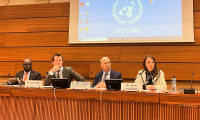The Institute shares lessons to inspire establishment of international network of National Mechanisms for Implementation, Reporting and Follow-up

Photo of panelists from the event. From left to right: Mr. Mahamane Cisse-Gouro, Director of the Human Rights Council and Treaty Mechanisms Division, OHCHR; Mr. Marc Limon, Executive Director, Universal Rights Group; H.E. Mr. Omar Zniber, Ambassador, Permanent Representative of the Kingdom of Morocco in Geneva; Ms. Mette Thygesen, International Director, the Danish Institute for Human Rights.
On February 28th 2023, a high-level event on the margins of the 52nd session of the UN Human Rights Council brought together stakeholders to discuss the establishment of an international network of National Mechanisms for Implementation, Reporting and Follow-up (NMIRF). The event was organised by the Permanent Missions to the United Nations of Morocco, Paraguay and Portugal, and featured Mette Thygesen, International Director of the Danish Institute for Human Rights (the Institute), as a panelist.
Following the adoption of the ‘Marrakesh Declaration’ in December 2022, around 20 states have shown interest in creating a network between NMIRFs. The need for direct peer-to-peer contacts between NMIRFs has been raised multiple times by states, including the Institute's partners and during the 2021 regional consultations of NMIRFs organised by the OHCHR. It should help raising their capacities in order to better implementation human rights standards nationally.
UN Human Rights Council Resolution 51/33 adopted on 7 October 2022 reiterated the need to nurture exchanges between NMIRFs, and requested the OHCHR to develop a virtual knowledge hub, which will become a key instrument for NMIRFs to exchange practice and interact in view of creating a community of practice. The idea of a network of NMIRFs complements those initiatives and should be developed in synergy.
Implementation is crucial
During the high-level panel, Mette Thygesen shared her reflections on how the experiences of governmental or National Human Rights Institutions (NHRIs) networks in the field of human rights could serve to inspire the future network of NMIRFs. Key lessons include the need for a network that embraces the diversity of NMIRFs in terms of their structures and mandates, and the importance of emphasizing the distinct and complementary roles of NHRIs and NMIRFs.
Crucially, Mette Thygesen spoke about the need to unpack and emphasize the “I” in NMIRF: “Governmental structures in charge of human rights do much more than reporting and follow-up. Many implement national, regional, and indeed international commitments, through inter-ministerial coordination and mainstreaming. This could be articulated in a (future) normative framework, and this network – and the Group of Friends – is ideally placed to promote that discussion."
Implementation is a fundamental dimension. NMIRFs should not be content with diligent and up-to-date reports to human rights bodies. They also need to effectively ensure that all ministries follow-up on recommendations.
An effective NMIRF network could also require the development of a normative framework or a set of guiding principles, akin to the role played by the Paris Principles in serving as a yardstick for NHRIs.
Together with other international stakeholders, the Institute will continue to support efforts aimed at strengthening the role of NMIRFs, through bilateral partnerships, pioneering research, and supporting the development of international guidance and tools for NMIRFs.
National Mechanisms for Implementation, Reporting and Follow-up (NMIRFs) are government bodies or agencies that engage with and prepare reports to international and regional human rights bodies.
These mechanisms have several functions, including:
- Implementation: Ensuring that human rights treaty obligations and recommendations are implemented.
- Reporting: Providing information and data to international human rights bodies on the human rights situation in the country.
- Follow-up: Monitoring and evaluating the implementation of human rights recommendations made by international human rights bodies and ensuring that they are put into practice at the national level.
